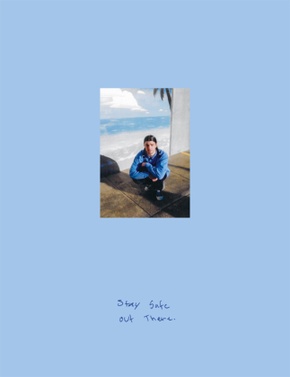Stay Safe Out There - Chantal Seitz
| Verlag | Distanz Verlag |
| Auflage | 2024 |
| Seiten | 102 |
| Format | 22,0 x 1,7 x 28,0 cm |
| Gewicht | 544 g |
| Artikeltyp | Englisches Buch |
| ISBN-10 | 3954766647 |
| EAN | 9783954766642 |
| Bestell-Nr | 95476664A |
"Ich sehe sonst immer nur, was das Knastfernsehen zeigt." - Collin Davis, ZEITmagazin
Collin Davis sitzt seit 18 Jahren im Gefängnis, er wurde verurteilt zu mindestens 45 Jahren Haft. Die Freundin seines Bruders, die Fotografin Chantal Seitz (geb. 1993 in Hardheim, lebt und arbeitet in Berlin), fragte ihn, was er von der Welt sehen möchte; der Beginn einer Brieffreundschaft und eines Dialogs über das Sehen und die Realität innerhalb und außerhalb des Gefängnisses.
Stay Safe Out There ist das Ergebnis dieses intensiven Briefwechsels. Das Künstlerinnenbuch zeigt, wie Seitz und Davis mithilfe der Fotografie über die Welt beiderseits der Gefängnismauern nachdenken und kommunizieren und wie das Strafvollzugssystem bestimmt, wer was sehen darf und wie es gesehen werden darf. Anhand von Briefen, E-Mails, Fotostrecken - diese nimmt Seitz nach den Wünschen von Davis auf -, aber auch Faksimiles von Gefängniswerbeprospekten des täglichen Bedarfs, Google-Street-View-Ansichte n der Gefängnismauern und Porträts von Davis selbst verwebt das Buch die Realitäten der beiden Protagonist_innen zu einem intensiven Austausch über das Sehen und Nichtsehen, die Isolation und den Kapitalismus der Gefängnisindustrie. Damit wirft es einen so persönlichen wie kollektiven Blick auf aktuelle Debatten über Reformen des Justizsystems zur Stärkung der Rechte von Gefangenen.
"All I really get to see is stuff on t.v. and not what the normal world looks like"-Collin Davis, ZEITmagazin
Collin Davis has been behind bars for eighteen years; he has been sentenced to at least forty-five years' imprisonment. His brother's girlfriend, the photographer Chantal Seitz (b. Hardheim, 1993; lives and works in Berlin) asked him what he wanted to see of the world. It was the beginning of a pen friendship and a dialogue about seeing and reality inside and outside the prison.
Stay Safe Out There is the result of an engrossing correspondence. The artist's book sh ows how Seitz and Davis use photography to think and communicate about the world on both sides of the prison's walls and how the corrections system determines who may see what and how it may be seen. Based on letters, emails, series of photographs-which Seitz captures as requested by Davis-as well as facsimiles of leaflets advertising convenience goods to inmates, Google Street View shots of the prison's walls, and portraits of Davis himself, the book interweaves the two protagonists' realities. A searching exchange of ideas on seeing and not seeing, on isolation and the capitalism of the prison industry, it frames a perspective that is both personal and collective on current debates over reforms to the criminal justice system designed to strengthen prisoners' rights.

